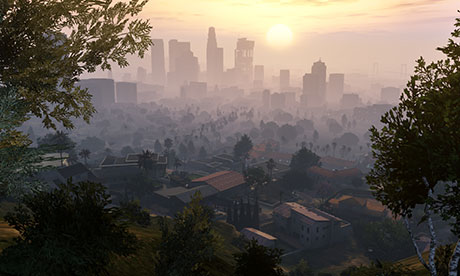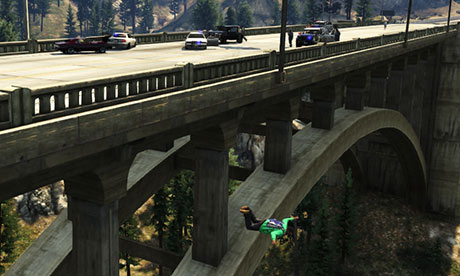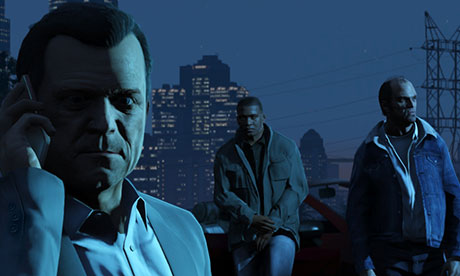Grand Theft Auto V: meet Dan Houser, architect of a gaming phenomenon
As the capo di tutti cappi of crime videogames returns in extravagant style, its creator insists that the console is now mightier than the movie camera
O9v-PvHN-Qs[/media]]
Grand Theft Auto is less a videogame franchise, more an interactive cultural barometer. Set in the US but born in Britain, its evolution over the past two decades from a scrappy, pixelated love letter to crime cinema into a fully explorable, high-definition, living, breathing, society-satirising personal playground has created a medium all of its own. The term "open world" has become shorthand for "GTA-like"; the game's control schemes, mission structures and re-branded products (iFruit smartphones, Jugular cars) are gaming tropes in themselves, while the slickly choreographed action has inspired as many films as have influenced it. Crime fiction will eat itself.
GTA's vast and action-packed virtual world is frequently more appealing to players than the real one, with 14% of British men admitting they are likely to throw a sickie on the launch day of a new game. Thanks to its gameplay innovations, and helped along by just a hint of controversy, the series has shifted 125 million units since its inception, becoming the fifth biggest-selling videogame franchise of all time.
Rockstar Games' co-founder and vice president of creativity Dan Houser has been at the eye of the storm since 1998. Despite having also given the world Red Dead Redemption, Max Payne and LA Noire, the GTA series is where his heart lies. "If you were to love any of your children more, you'd certainly love GTA the most," he smiles. We meet at Rockstar's understated Fulham offices, where the hedonism implied by the company name seems to be secondary to good old-fashioned hard work. "Something like this takes a lot of work and effort, so you'd better be passionate about it. We take every game release very seriously. [For GTA V] we had to liven it up and make our lives unpleasant again."
"Livening up" is something of an understatement. Rockstar is known for its meticulous recreations of sprawling cities, technological leaps and military-grade internal security. Grand Theft Auto V arrives after four years of development, a 1,000-page script, months of motion and voice capture, and a process that saw 80 per cent of the ever-growing company – eight international studios and counting – involved in recreating a fully functioning metropolis based closely on Los Angeles. The city, as ever, is the leading character.
"The single longest process is always creating the world," confirms Houser, revealing that the new Los Santos map is bigger than those of GTA IV, GTA: San Andreas and Red Dead Redemption combined. It's not surprising to learn that he sat geography at Oxford. "We spent a minimum of 100 days in Los Angeles on research trips, probably more," he says of production, which began at the height of the US's sub-prime financial crisis in 2010. "Out and about, all night long with weird people, strange cops showing us around, a lot of first-hand research. We spoke to FBI agents that have been undercover, experts in the Mafia, street gangsters who know the slang – we even went to see a proper prison. These poor buggers in the middle of the salt flat desert, miles away. It was eye-openingly depressing."

The 39-year-old Londoner has been surveying every last, dusty corner of Los Angeles since 2004's GTA: San Andreas and has become something of an expert on the city's psychogeography in the process. "LA is this embodiment of 20th-century American desires: the houses, the gardens, the tans, all slightly fake. It's the end of the western world – the suns sets and then it's tomorrow. But the industry is movies or, equally phoney, real estate. It's people trying to escape their pasts and reinvent themselves. If GTA IV was a classic New York story, this is the endpoint of the American dream."
Houser is a flurry of words and feverish gum-chewing. He's considered and articulate, yet sometimes seemingly on fast-forward, extended pauses followed by an explosion of thoughts and ideas ("I am scattergun to the nth degree," he laughs). We talk for an hour but the transcript runs to more than 10,000 words.
Despite Rockstar's sometimes secretive aura, Houser is very direct and has strong views on GTAV's relationship with the movies ("We don't need to hark back to film when technology allows us to produce our own response to real places"), on the lack of playable female characters ("The concept of being masculine was so key to this story") and on game conferences like E3 and Gamescom, which he no longer attends ("You don't play a videogame in a room with 20,000 people doing the same thing unless you're a lunatic").Based in New York, he's part of a creative collective that includes his older brother and Rockstar CEO Sam (whose first big job was working with Pop Idol creator Simon Fuller), producer Leslie Benzies and art director Aaron Garbut, who've all been working on the series together since GTA III in 2001. For the last two games, this core team has also included co-writer Rupert Humphries, son of Barry.
"I'm surrounded by people with raging OCD, people much more organised and clever than me," chuckles Houser. "I'm so unstructured. People can never come into my office, it's so messy – there's no plan, it's just full of scraps of paper and notes, chaos. I'm always terrified of losing my BlackBerry, as I write things on it that are so vital and I can't type fast enough on an iPhone."

It seems that GTA V's magpie-like collage of influences and reference points is very much a reflection of its lead writer's mindset. "So much of the media I consume now comes through the internet. Books, movies, TV shows, games, iPhone games, other rubbish on the go, obsessively and unobsessively. I always say I'm going to sit and play every single game or read all of this great writer or watch all of these movies, and it lasts about three minutes. Then it just goes back into the miasma of rubbish you're plucking out."
It's a good analogy of a typical GTA game: a raucous mix of crime-caper thrills, cinematic set-pieces and pop-culture humour culled from the team's collective psyche that also gives the player the option to ignore the tightly woven story if they so wish and venture off-piste at any time. In GTA V's case, this means anything from exploring underwater shipwrecks to playing a few sets of multiplayer tennis in the hugely ambitious, cloud-based GTA Online side show. 2014's next-gen console buzz phrase is the "persistent online world", in which thousands of human-controlled players run around an evolving, narratively driven virtual space; it's fitting that having invented the open-world genre, Rockstar have tackled this new concept before anyone else, too.
"Like all fiction, games are transportive, yet what makes them unique is that you follow your own eyes through the world," says Houser. "Games are, at one level, a progression on from a film – you jump off a cliff rather than a stuntman jumping off a cliff – but open-world games are actually more than that. It's the being rather than the doing. You're going to see different things than another player, and when you walk up a hill yourself and see the sun setting on the ocean, that's a lot different to me taking a camera up there and making you see it."
As for that ambitious plot, you now control three protagonists instead of one, planning and performing elaborate heists as meticulously as anything out of Heat or Drive. You're able to switch between these three characters in real-time as you create your own action set-pieces and personal dramas, an evolving score by Tangerine Dream's Edgar Froese building tension around you. Then there's the usual star-studded radio stations, featuring 240 licensed songs, from Bootsy Collins to Tyler, The Creator. If Rockstar is the director, we're the editor.
"Having three protagonists allows us to create nuanced stories, not a set of archetypes," says Houser. "Rather than seeming like you've got this super-criminal who can do everything effortlessly, they're all good and bad at different things." It also led to the creation of more rounded, believable characters. "We liked the idea of a protagonist retiring with a family, and how awful that would be. We've never done anything like that and you don't really see it in games - to feed into these concepts of parenting and pseudo-parenting."
With the series now able to support such textured storylines, Hollywood's top studios must surely have been enquiring about the film licence? "We've been offered, many times, and it's never appealed," says Houser. "The money's never been close to be worth risking one's crown jewels. Our small dabblings with Hollywood have always left us running back to games. The freedom we have to do what we want creatively is of enormous value. The second you go near Hollywood, people seem willing, or have been forced, to lose a lot of that control. That sort of amorphous 'that won't test well' attitude is exactly how we don't work. We've always tried to think of stuff that's innovative and new, and to go into a world where that's not encouraged would be horrible."

Now that the global videogame market is worth $67 billion and longform TV dramas are overtaking cinema in the cultural cool stakes, you could argue that there's less reason than ever to jump to the big screen anyway. Grand Theft Auto IV alone made $310m on release day, then a world record for any form of entertainment, including movies.
"There's still plenty of kudos in doing a film, but you shouldn't ever do anything in your life for kudos," advises Houser. "It's much easier to imagine GTA as a TV series, as the form is closer, but I still think we'd be losing too much to ever actually do it. We've got this big open-world experience that's 100 hours long, and that gives players control over what they do, what they see, and how they see it. A world where you can do everything from rob a bank to take a yoga lesson to watch TV, all in your own time. How do you condense that into a two-hour or 12-hour experience where you take away the main things: player agency and freedom?"
He pauses for breath. "We love games and we think we've got something to say in games, and that games have plenty to say. So shouldn't we just continue doing that?" It would be a crime not to.
Source: http://www.theguardian.com/technology/2013/sep/07/grand-theft-auto-dan-houser
As the capo di tutti cappi of crime videogames returns in extravagant style, its creator insists that the console is now mightier than the movie camera
O9v-PvHN-Qs[/media]]
Grand Theft Auto is less a videogame franchise, more an interactive cultural barometer. Set in the US but born in Britain, its evolution over the past two decades from a scrappy, pixelated love letter to crime cinema into a fully explorable, high-definition, living, breathing, society-satirising personal playground has created a medium all of its own. The term "open world" has become shorthand for "GTA-like"; the game's control schemes, mission structures and re-branded products (iFruit smartphones, Jugular cars) are gaming tropes in themselves, while the slickly choreographed action has inspired as many films as have influenced it. Crime fiction will eat itself.
GTA's vast and action-packed virtual world is frequently more appealing to players than the real one, with 14% of British men admitting they are likely to throw a sickie on the launch day of a new game. Thanks to its gameplay innovations, and helped along by just a hint of controversy, the series has shifted 125 million units since its inception, becoming the fifth biggest-selling videogame franchise of all time.
Rockstar Games' co-founder and vice president of creativity Dan Houser has been at the eye of the storm since 1998. Despite having also given the world Red Dead Redemption, Max Payne and LA Noire, the GTA series is where his heart lies. "If you were to love any of your children more, you'd certainly love GTA the most," he smiles. We meet at Rockstar's understated Fulham offices, where the hedonism implied by the company name seems to be secondary to good old-fashioned hard work. "Something like this takes a lot of work and effort, so you'd better be passionate about it. We take every game release very seriously. [For GTA V] we had to liven it up and make our lives unpleasant again."
"Livening up" is something of an understatement. Rockstar is known for its meticulous recreations of sprawling cities, technological leaps and military-grade internal security. Grand Theft Auto V arrives after four years of development, a 1,000-page script, months of motion and voice capture, and a process that saw 80 per cent of the ever-growing company – eight international studios and counting – involved in recreating a fully functioning metropolis based closely on Los Angeles. The city, as ever, is the leading character.
"The single longest process is always creating the world," confirms Houser, revealing that the new Los Santos map is bigger than those of GTA IV, GTA: San Andreas and Red Dead Redemption combined. It's not surprising to learn that he sat geography at Oxford. "We spent a minimum of 100 days in Los Angeles on research trips, probably more," he says of production, which began at the height of the US's sub-prime financial crisis in 2010. "Out and about, all night long with weird people, strange cops showing us around, a lot of first-hand research. We spoke to FBI agents that have been undercover, experts in the Mafia, street gangsters who know the slang – we even went to see a proper prison. These poor buggers in the middle of the salt flat desert, miles away. It was eye-openingly depressing."

The 39-year-old Londoner has been surveying every last, dusty corner of Los Angeles since 2004's GTA: San Andreas and has become something of an expert on the city's psychogeography in the process. "LA is this embodiment of 20th-century American desires: the houses, the gardens, the tans, all slightly fake. It's the end of the western world – the suns sets and then it's tomorrow. But the industry is movies or, equally phoney, real estate. It's people trying to escape their pasts and reinvent themselves. If GTA IV was a classic New York story, this is the endpoint of the American dream."
Houser is a flurry of words and feverish gum-chewing. He's considered and articulate, yet sometimes seemingly on fast-forward, extended pauses followed by an explosion of thoughts and ideas ("I am scattergun to the nth degree," he laughs). We talk for an hour but the transcript runs to more than 10,000 words.
Despite Rockstar's sometimes secretive aura, Houser is very direct and has strong views on GTAV's relationship with the movies ("We don't need to hark back to film when technology allows us to produce our own response to real places"), on the lack of playable female characters ("The concept of being masculine was so key to this story") and on game conferences like E3 and Gamescom, which he no longer attends ("You don't play a videogame in a room with 20,000 people doing the same thing unless you're a lunatic").Based in New York, he's part of a creative collective that includes his older brother and Rockstar CEO Sam (whose first big job was working with Pop Idol creator Simon Fuller), producer Leslie Benzies and art director Aaron Garbut, who've all been working on the series together since GTA III in 2001. For the last two games, this core team has also included co-writer Rupert Humphries, son of Barry.
"I'm surrounded by people with raging OCD, people much more organised and clever than me," chuckles Houser. "I'm so unstructured. People can never come into my office, it's so messy – there's no plan, it's just full of scraps of paper and notes, chaos. I'm always terrified of losing my BlackBerry, as I write things on it that are so vital and I can't type fast enough on an iPhone."

It seems that GTA V's magpie-like collage of influences and reference points is very much a reflection of its lead writer's mindset. "So much of the media I consume now comes through the internet. Books, movies, TV shows, games, iPhone games, other rubbish on the go, obsessively and unobsessively. I always say I'm going to sit and play every single game or read all of this great writer or watch all of these movies, and it lasts about three minutes. Then it just goes back into the miasma of rubbish you're plucking out."
It's a good analogy of a typical GTA game: a raucous mix of crime-caper thrills, cinematic set-pieces and pop-culture humour culled from the team's collective psyche that also gives the player the option to ignore the tightly woven story if they so wish and venture off-piste at any time. In GTA V's case, this means anything from exploring underwater shipwrecks to playing a few sets of multiplayer tennis in the hugely ambitious, cloud-based GTA Online side show. 2014's next-gen console buzz phrase is the "persistent online world", in which thousands of human-controlled players run around an evolving, narratively driven virtual space; it's fitting that having invented the open-world genre, Rockstar have tackled this new concept before anyone else, too.
"Like all fiction, games are transportive, yet what makes them unique is that you follow your own eyes through the world," says Houser. "Games are, at one level, a progression on from a film – you jump off a cliff rather than a stuntman jumping off a cliff – but open-world games are actually more than that. It's the being rather than the doing. You're going to see different things than another player, and when you walk up a hill yourself and see the sun setting on the ocean, that's a lot different to me taking a camera up there and making you see it."
As for that ambitious plot, you now control three protagonists instead of one, planning and performing elaborate heists as meticulously as anything out of Heat or Drive. You're able to switch between these three characters in real-time as you create your own action set-pieces and personal dramas, an evolving score by Tangerine Dream's Edgar Froese building tension around you. Then there's the usual star-studded radio stations, featuring 240 licensed songs, from Bootsy Collins to Tyler, The Creator. If Rockstar is the director, we're the editor.
"Having three protagonists allows us to create nuanced stories, not a set of archetypes," says Houser. "Rather than seeming like you've got this super-criminal who can do everything effortlessly, they're all good and bad at different things." It also led to the creation of more rounded, believable characters. "We liked the idea of a protagonist retiring with a family, and how awful that would be. We've never done anything like that and you don't really see it in games - to feed into these concepts of parenting and pseudo-parenting."
With the series now able to support such textured storylines, Hollywood's top studios must surely have been enquiring about the film licence? "We've been offered, many times, and it's never appealed," says Houser. "The money's never been close to be worth risking one's crown jewels. Our small dabblings with Hollywood have always left us running back to games. The freedom we have to do what we want creatively is of enormous value. The second you go near Hollywood, people seem willing, or have been forced, to lose a lot of that control. That sort of amorphous 'that won't test well' attitude is exactly how we don't work. We've always tried to think of stuff that's innovative and new, and to go into a world where that's not encouraged would be horrible."

Now that the global videogame market is worth $67 billion and longform TV dramas are overtaking cinema in the cultural cool stakes, you could argue that there's less reason than ever to jump to the big screen anyway. Grand Theft Auto IV alone made $310m on release day, then a world record for any form of entertainment, including movies.
"There's still plenty of kudos in doing a film, but you shouldn't ever do anything in your life for kudos," advises Houser. "It's much easier to imagine GTA as a TV series, as the form is closer, but I still think we'd be losing too much to ever actually do it. We've got this big open-world experience that's 100 hours long, and that gives players control over what they do, what they see, and how they see it. A world where you can do everything from rob a bank to take a yoga lesson to watch TV, all in your own time. How do you condense that into a two-hour or 12-hour experience where you take away the main things: player agency and freedom?"
He pauses for breath. "We love games and we think we've got something to say in games, and that games have plenty to say. So shouldn't we just continue doing that?" It would be a crime not to.
Source: http://www.theguardian.com/technology/2013/sep/07/grand-theft-auto-dan-houser
